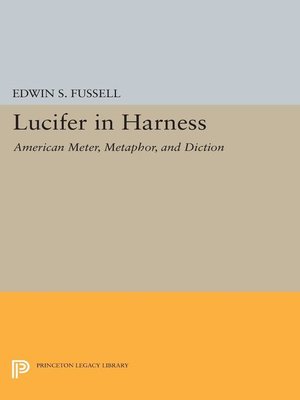Lucifer in Harness
ebook ∣ American Meter, Metaphor, and Diction · Princeton Legacy Library
By Edwin S. Fussell

Sign up to save your library
With an OverDrive account, you can save your favorite libraries for at-a-glance information about availability. Find out more about OverDrive accounts.
Find this title in Libby, the library reading app by OverDrive.



Search for a digital library with this title
Title found at these libraries:
| Library Name | Distance |
|---|---|
| Loading... |
For nearly two hundred years the rebellious American poet has been reluctantly harnessed to the English language and literary tradition. In a triptych of essays, Edwin Fussell attempts "to explore the fundamental dilemma of American poetry as it appears in the three crucial fields of meter, metaphor, and poetic diction, the three crucial fields of American poetry (taken as a whole) most studiously avoided by American scholars, but not, as I intend to show, by American poets."
Writing in a provocative critical style attuned to the poets he discusses, Edwin Fussell explores the dilemma of the American poet who wants to write a distinctly "American" poetry but must do so in a language imbued with the sensibility of English poetry and culture. Because these are different from and sometimes antithetical to American cultural ideals and commitments, the harness chafes. The emphasis is on those poets who have successfully created a truly American poetry—Poe, Whitman, Pound, Eliot, and Williams—but the author also discusses Hart Crane, Wallace Stevens, Emerson, Bryant, Lowell, and Frost, among others.
Originally published in 1973.
The Princeton Legacy Library uses the latest print-on-demand technology to again make available previously out-of-print books from the distinguished backlist of Princeton University Press. These editions preserve the original texts of these important books while presenting them in durable paperback and hardcover editions. The goal of the Princeton Legacy Library is to vastly increase access to the rich scholarly heritage found in the thousands of books published by Princeton University Press since its founding in 1905.







